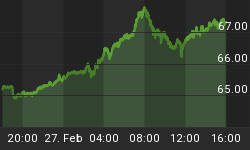When combined with last week's soft GDP numbers, today's weak jobs report, which contained an up-tick in the unemployment rate, gives the Fed all the cover it claims to need to ignore evidence of accelerating inflation and finally come through with the highly anticipated "pause." Global stocks, bonds, foreign currencies and gold will likely react positively to this development. However, in relatively short order, I expect U.S. markets to come under renewed selling pressure, particularly the bond market, as increasing inflation fears and diminished demand for long-term dollar denominated debt undermine the rally.
In my opinion, the relative calm created by the long, slow, and utterly predictable series of ¼ point rate hikes over the past two year has lent primary support for the U.S. dollar and the bond market. Once this prop is removed by a Fed pause, despite a knee-jerk bond rally, I expect both bonds and the dollar to be sold. But what the Fed giveth on the short end, the market will likely taketh away on the long end. Ironically, when the Fed finally stops notching up short-term rates, the market will likely start pushing up long-term rates. This will frustrate the Fed and Wall Street bulls who had hoped that a pause would breathe life into the stagnating economy.
A surge in long-term rates will immediately translate into higher mortgage rates, putting the final nail in real estate's coffin. The bubble is finally dead, may it rest in peace. Unfortunately the same can not be said for those who bought into it, and those who financed the speculation. For them, and the entire nation for that matter, the real estate nightmare is just about to begin.
Despite the strong likelihood that the hoped-for soft landing for the economy will more resemble a crash and burn, consumer price increases will only accelerate. This will come as a shock to most economists and Wall Street strategists who naively expect slower growth to cool inflation. Unfortunately, when it comes to inflation's effects on consumer prices, they ain't seen nothing yet. When the stagflation scenario is finally embraced as fact, things will really start to unravel for the U.S. dollar, bonds, stocks, and real estate.
The dollar fell sharply in reaction to today's data, with the British pound rising to its highest level in fourteen years. Gold prices surged as well, confirming that the rally in U.S. stocks and bonds will likely be short-lived. Ironically, the mythical "strong dollar policy" which Treasury Secretary Paulson reiterated in robotic fashion only last week in an interview on CNBC, may finally be put to the test. As a result, either it, or the pause, will have to be sacrificed. Either way, it's bad new for the U.S. economy, its financial markets, and the dollar itself.
Don't wait for reality to set in. Protect your wealth and preserve you purchasing power before it's too late. Discover the best way to buy gold at www.goldyoucanfold.com, download my free research report on the powerful case for investing in foreign equities available at www.researchreportone.com, and subscribe to my free, on-line investment newsletter at http://www.europac.net/newsletter/newsletter.asp.















